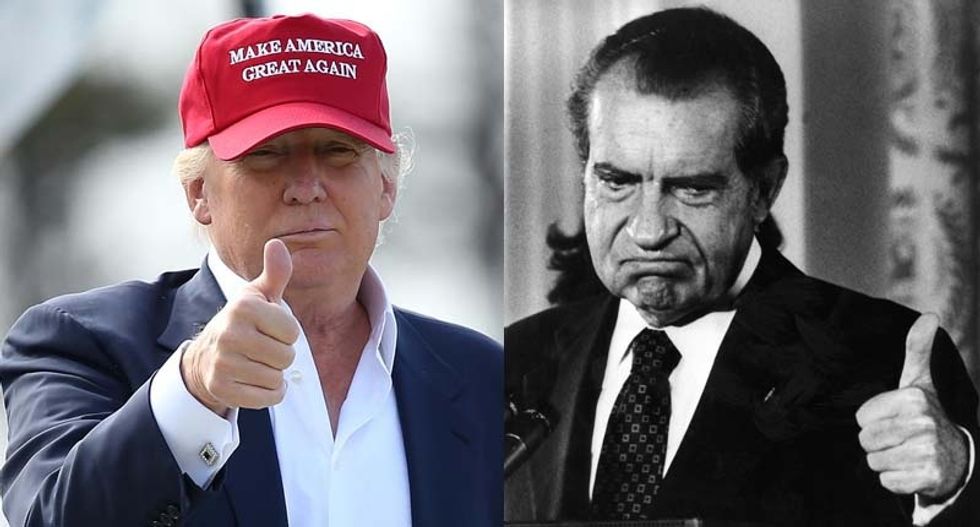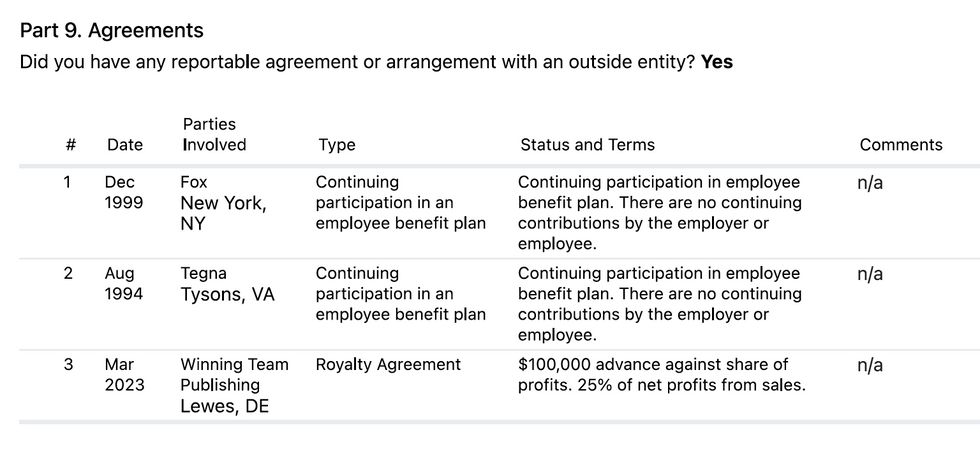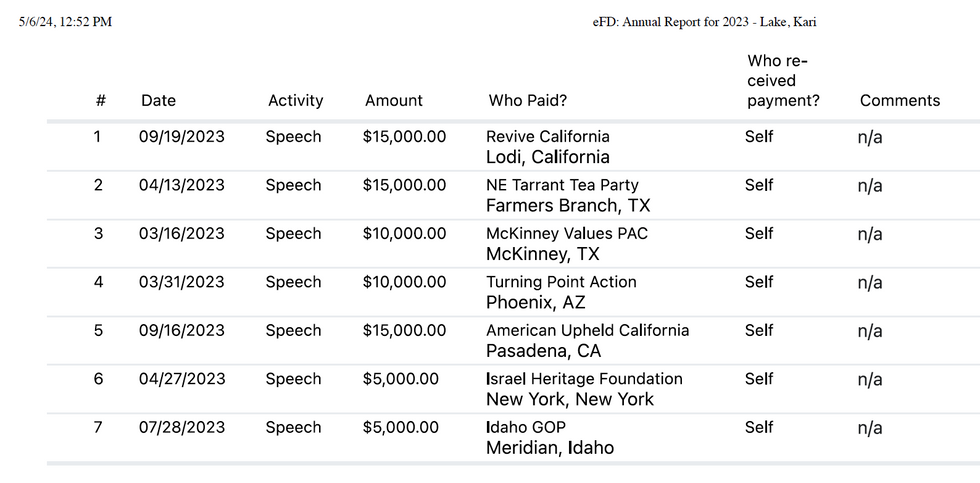Two overriding factors contribute to this bizarre reality.
Firstly, there’s very little — legally speaking — preventing Trump from doing so.
ALSO READ: 16 worthless things Trump will give you for your money
Secondly, Trump leads president Joe Biden by six percentage points in key states for November’s presidential election, according to a Bloomberg News/Morning Consult poll. Only an unforeseen calamity, such as a health crisis, could keep Trump from securing the Republican presidential nomination come July in Milwaukee.
Trump has already faced the possibility of detention for violating a gag order in his current trial in Manhattan, where he’s charged in state court with falsifying business records to cover up a hush money payment to porn actor and producer Stormy Daniels.
So far, fines — not jail — have been the outcome for Trump violating Judge Juan Merchan’s order, with Merchan warning Trump that Merchan said that New York state law does not permit him to escalate fines against Trump, which led him to conclude that future violations would prompt him to "consider whether in some instances, jail may be a necessary punishment."
But Trump, being Trump, used the self-generated gag order drama to fundraise for his campaign: “LET’S MEET BEFORE I’M LOCKED UP!” he texted supporters with a link to a donation page.

Multiple reports indicate the Secret Service has started planning for what it will do if Trump is no longer a free man.
The other cases that could end with a prison sentence or other form of detention for Trump:
- In Georgia, Trump and co-defendants including Mark Meadows, Trump’s White House chief of staff, and Rudy Giuliani, former New York mayor and Trump adviser, face state charges of election subversion. Judge Scott McAfee hasn’t set a date for the trial to begin. Fulton County District Attorney Fani Willis has asked for it to start August 5.
- In Washington, D.C., Trump faces federal charges of election subversion. The Supreme Court heard arguments that presidential immunity protects Trump from the charges, although to date, they have not ruled on the matter.
- In Florida, Trump faces federal charges of illegally retaining classified documents after he left the White House. Judge Aileen Cannon set May 20 as the start date for a trial, but it’s expected to be postponed.
Trump is required to be present in the Manhattan courtroom for the hush money trial. He can, however, continue to campaign at night, on weekends and other off days for the court. He planned a campaign rally in North Carolina in April, but his campaign scrubbed it, citing severe weather.
“Trump’s legal problems shouldn’t affect his campaign. Many of his supporters believe that he is being treated unfairly, and there is no prohibition against a defendant under indictment or even a convicted felon from serving as president,” said Neama Rahmani, a former assistant U.S. attorney and president of West Coast Trial Lawyers. “Theoretically, Trump could even be president while in prison.”
ALSO READ: A criminologist explains how Americans achieve a post-Trump democracy
Indeed, the U.S. Constitution stipulates only that a presidential candidate be a natural-born citizen of the United States, be at least 35 years old and a U.S. resident for 14 years. Trump easily checks all those boxes. And congressional Democrats’ strongest efforts to potentially disqualify Trump from ever again seeking the presidency — convicting him following impeachment trials — failed.
So what would it take for Trump to run a presidential campaign — or govern the nation — from prison?
Raw Story interviewed historians, legal experts, political operatives and former government leaders who pieced together a playbook for how he could do it — and the peril that he’d face ahead of his 2024 general election rematch with President Joe Biden.
Campaigning from a cell
The 88 felony charges Trump faces across four criminal cases carry significant potential jail time.
Being behind bars would, of course, prevent Trump from campaigning in his signature fashion: at big, rowdy MAGA rallies.
But Amani Wells-Onyioha, operations director at Democratic political firm Sole Strategies, envisions Trump still figuring out ways to communicate with potential voters.
“There's no doubt in my mind that he would have some recorded press from the little prison phone. There's no doubt in my mind that he would set up press opportunities whenever he's out on the yard getting his recreational use in, that there would be cameras there,” Wells-Onyioha said. “He would be using every opportunity to campaign. I don't see him stopping at all, and I only see him using this as fuel to make him go harder.”
ALSO READ: Revealed: What government officials privately shared about Trump not disclosing finances
Keeping up his Truth Social posts from prison might not be such a challenge for Trump, Wells-Onyioha said, as some jails and prisons allow internet access.
“I do see him using the internet because that's all that he has, and he's great at that already,” Wells-Onyioha said. “He's a huge internet, TV personality type of guy, so it really would just force him to be in a position to do something that he's the best at, which is unfortunate for the country, but as far as he's concerned, I think he thinks that this is political gold for himself.”
Plus, Trump’s 2024 presidential campaign is flush with staffers. He enjoys the support of super PACs, which may raise and spend unlimited amounts of money on his behalf to promote the former president and attack his opponents.
And few politicians are as good at Trump at presenting himself as a victim — he’s single-handedly vaulted the terms “witch hunt,” “deep state,” “hoax” and “fake news” into the contemporary political lexicon. As an inmate, Trump could become a martyr to the MAGA cause. During the current trial, he has routinely casts himself, falsely, as a victim of a political vendetta by President Biden and unfair treatment from the judge and prosecutors.
If not prison, maybe jail
Although it seems unlikely Trump will be serving an active prison sentence before the 2024 election, it’s conceivable he could wind up in pre-trial confinement while campaigning. That possibility came up less than a week into his Manhattan trial.
“He has to behave himself during a trial, and that's not beyond the realm of possibility that he'll act up, thinking that somehow he can win over the jury, but that would be a mistake,” said Kevin O’Brien, a former assistant U.S. attorney and partner at Ford O’Brien Landy LLP who specializes in white-collar criminal defense.
Brazenly defying a judge’s order or attempting to intimidate witnesses are among the more common ways a defendant can get himself thrown in jail before or during his trial.
This isn’t merely conceptual, according to Mike Lawlor, a criminal justice professor at the University of New Haven and former member of the Connecticut House of Representatives, who helped lead impeachment hearings against then-Gov. John Rowland, who ultimately pleaded guilty in federal court to political corruption.
ALSO READ: A neuroscientist reveals how Trump and Biden's cognitive impairments are different
Lawlor expects delays in the federal trial — jury selection alone for a former president could prove a months-long headache — so he’s doubtful the trial will even have started in time for the 2024 election.
Still, knowing Trump’s penchant for cutting outbursts, Lawlor can envision a judge sanctioning Trump for defying directives. Trump not only has one judge to contend with, but four, given the multiple legal actions against him.
“The opportunity to engage in contempt of court or witness tampering or obstruction of justice is fraught at this point. I’m not sure he has the self-control to keep himself from doing something that would get him confined pre-trial,” Lawlor said.
The U.S. House Jan. 6 select committee accused Trump of potential witness tampering, and Lawlor says he’s monitoring similar allegations here, especially because so many of the witnesses are GOP staffers of the former president.
Trump’s former lawyer, Michael Cohen, and Hope Hicks, who worked in Trump’s White House, are expected to testify in the New York case.
“It’s so easy to imagine a situation where someone could be contacted and intimidated,” Lawlor said. “I think the temptation to do that for a guy like Trump is probably irresistible. I’m not sure his attorneys or the advisors he listens to can stop him from doing so. I don’t rule it out. As I said, it’s unlikely, but I can definitely see it happening.”
Using legal danger to fuel fundraising
For several months, the Trump campaign has used his legal troubles to motivate donors. Take emails to supporters during the Manhattan trial.
“The heartless thugs are forcing me to skip my son’s graduation!” Trump wrote, although the judge hasn’t made a decision on the issue. “They want to ruin my life! … Democrats are going to be raising millions while I can’t campaign, so I’m depending on my strongest supporters to help keep us afloat.”
Another of his appeals for campaign money during the trial said, “I could be locked up for life. I should be campaigning across America and fighting for our country. But instead, I'm stuck in Biden's corrupt court AGAIN.”
Trump is being tried in state court by the Manhattan district attorney, not by the Biden administration.
Yet another example of Trump’s use of the trial to raise money: “I JUST STORMED INTO COURT. But instead, I’m stuck in Biden’s Corrupt Court AGAIN facing 34 FELONIES & LIFE IN PRISON. TALK ABOUT TRUMP DERANGEMENT SYNDROME!”
Trump has trailed Biden in fundraising. The latest Federal Election Commission filings show Biden’s campaign committee with $85 million of cash on hand at the end of March and Trump’s campaign committee with $45 million, not counting the various super PACs and party committees that support them.
The political monetization of Trump’s legal woes grows deeper by the month. Go to Trump’s campaign website and you’ll find several items on sale — a black-and-white ceramic coffee mug is $24 — featuring a fake mugshot of Trump above the words “NOT GUILTY”. Trump is also offering his supporters worthless trinkets and honorifics with effectively no discernible value at all — in exchange for a campaign donation.
The Federal Election Commission, which enforces federal campaign finance laws, would have no grounds to intervene in Trump’s fundraising efforts while facing criminal charges or even time in jail or prison, said Ann Ravel, who served as an FEC commissioner from 2013 to 2017, including one year as the commission’s chairwoman.
Trump’s campaign could easily continue sending supporters incessant fundraising emails and text messages in Trump’s name.
“The only problems for him would be if there's failure to disclose, or if people are giving more than the limits, all of the things that are traditional FEC issues, but they don't have the authority to do anything with regard to a person who's been indicted and is still fundraising,” Ravel said. “That in and of itself is not sufficient for the FEC to take any action.”
Lessons of Eugene Debs, incarcerated presidential candidate
Trump wouldn’t be the first candidate to run for president from prison if he were convicted.
In the weeks before the 1920 election, Eugene V. Debs, the Socialist Party candidate for president of the United States and an inmate in federal prison, touched on the significance of the moment.
“Has there ever been anything like it in American history before?” Debs said, as reported by the socialist newspaper Appeal to Reason. “Will there ever be anything like it in American history again? We must impress it upon the people that this scene is symbolic of what has befallen this country.”
There has been one other. Lyndon LaRouche, whom The New Republic called “The Godfather of Political Paranoia,” ran from prison in 1992 after being convicted of tax evasion and mail fraud.
ALSO READ: 11 ways Trump doesn’t become president
His vice presidential running mate, the Rev. James Bevel, did most of the campaigning. This suggests that a jailed Trump could lean heavily on the presence of a charismatic vice presidential candidate.
LaRouche received .02% of the popular vote — 26,334.
Debs, who was serving a 10-year sentence for decrying the United States’ involvement in World War I, received 3.4% of the popular vote — 919,799.
He received 6% of the vote as a candidate eight years earlier, in 1912.
 lllustration of Eugene Debs while running for president in prison. Indiana State University archives
lllustration of Eugene Debs while running for president in prison. Indiana State University archives
While emphasizing that she’s speaking as an individual, Allison Duerk, director of the Eugene V. Debs Museum, located in Debs’ home in Terre Haute, Ind., said she cringes at comparisons between Debs and Trump. In material ways, the two men are polar opposites.
“I bristle at recent casual references to the 1920 campaign — not because they are inaccurate on the surface, but because these two men and their respective projects are diametrically opposed,” she told Raw Story.
Duerk does believe Debs predicted the emergence of American political leaders such as Trump.
“Take this quote from the speech that got him locked up,” she said, quoting Debs: “‘In every age it has been the tyrant, the oppressor and the exploiter who has wrapped himself in the cloak of patriotism, or religion, or both to deceive and overawe the people.’"
In an Appeal to Reason article, Debs said he believed in change “but by perfectly peaceful and orderly means.” He added, “Never in my life have I broken a law or advised others to do so.”
Unlike Trump, who nurses grievances daily, the article said of Debs, “Nothing embitters him. Injustice, oppression, persecution, savagery do not embitter him. It is a stirring, an uplifting thing to find a man who has suffered so much and remains so ardent and so pure.”
The U.S. government and the prison warden made small accommodations to Debs’ candidacy. He was, for one, allowed a single written message per week to voters.
“Where Debs had once stormed the country in a verbal torrent,” wrote Ernest Freeberg, author of Democracy’s Prisoner, “he would now have five hundred words a week.”
Debs still had some of the trappings of a political campaign, including a button that had his photo from prison with the words, “For President - Convict No. 9653.” He had printed material that said, “From Atlanta to the White House, 1920,” a reference to his residency inside the Atlanta Federal Penitentiary.
On election night, Debs received the results in the warden’s office and soon conceded the election to President-elect Warren Harding.
In his book Walls and Bars, Debs wrote that the question came up in the room about his potential ability to pardon himself as president — an action over which Trump has reportedly mused.
“We all found some mirth in debating it,” Debs wrote.
Serving as president from prison
If Trump ran a successful campaign from jail or prison, is there anything stopping him from assuming the Oval Office if he were elected president?
“There is nothing in our traditions or the Constitution that prevents someone who is indicted or convicted or, in fact, serving in jail, from also serving as the president,” said Harold Krent, law professor at the Chicago-Kent College of Law, who formerly worked for the Department of Justice. “Does it make any sense? No. But there is no Constitutional disablement from that happening. So, you could think of a scenario in which the case goes to trial, maybe after the primary and results in a prison time with President Trump and then he is inaugurated, and he gets to serve as president from some prison farm somewhere.”
Allan Lichtman, a professor of history at American University, said “of course” Trump would just pardon himself of any federal crimes were he were reelected president. There’s also the possibility of Trump attempting to preemptively pardon himself, with then-President Gerald Ford’s pardoning of Richard Nixon serving as an imperfect template.
 Donald Trump and Richard Nixon (Composition / RawStory)
Donald Trump and Richard Nixon (Composition / RawStory)
But if Trump is convicted on any state-level charges, where federal pardons do not apply, that’s a different story.
“That's unprecedented, but the pardon power is pretty absolute,” Lichtman. “He can’t pardon himself for the New York case because that’s a state case. If he's convicted in New York, he's stuck. If … he's convicted in Georgia, he can’t pardon himself from that either, because that's also a state case.”
Trump’s ability to pardon himself is widely debated in the academic community, Krent said.
“There's no law on the books that says you can't. You just have to reason from the idea of separation of powers and the Constitution or to think that it doesn't make any sense to have one person aggregate or accumulate so much power,” Krent said. “As a constitutional matter, I think that that would be too much of a conflict of interest to be able to pardon yourself.”
The Constitution could be interpreted — ostensibly by the U.S. Supreme Court — that an imprisoned president wouldn’t qualify as capable of carrying out his duties, preventing him from taking the office, Ravel said.
“There's nothing to stop him from becoming president either because the provisions in the Constitution about the presidency and the requirements for presidency don't reflect any concern if a president has been indicted or is in jail,” Ravel said. “Although if he goes to jail, it would create a problem for him because the Constitution does have concerns about the inability to carry out the obligations of the office, which he certainly wouldn't be able to do in jail.”
Specifically, Section 4 of the Constitution’s 25th Amendment potentially empowers Congress to determine — via a two-thirds vote of both chambers — that a president is “unable to discharge the powers and duties of his office” and thereby transfer presidential powers to the vice president.
But if Trump is elected and a Trump trial takes place after November 2024, some of his legal peril could subside — at least at the federal level.
“There's clear Department of Justice memos and policies. It's pretty clear that a sitting president cannot be prosecuted,” Rahmani said.
If Trump won and was convicted but on appeal, he would “probably” still be able to get inaugurated, Krent said.
“The question is whether they would stop the appeal and let him serve out the presidency before it would continue,” Krent said. “Uncharted waters in terms of how this would go. It's gonna affect the primary. It would affect the general election, and it certainly would affect his ability to conduct a presidency.”
A version of this story was originally published on June 13, 2023, and updated to include new developments.




 Luke Farmer of Douglasville, Ga., launched a campaign to challenge Rep. Marjorie Taylor Greene (R-GA) but didn't qualify for the ballot. (Photo by Alexandria Jacobson/Raw Story)
Luke Farmer of Douglasville, Ga., launched a campaign to challenge Rep. Marjorie Taylor Greene (R-GA) but didn't qualify for the ballot. (Photo by Alexandria Jacobson/Raw Story) Wendy Davis, of Rome, Ga., ran in the Democratic primary to replace Rep. Marjorie Taylor Greene (R-GA) in 2022. (Photo by Alexandria Jacobson/Raw Story)
Wendy Davis, of Rome, Ga., ran in the Democratic primary to replace Rep. Marjorie Taylor Greene (R-GA) in 2022. (Photo by Alexandria Jacobson/Raw Story) Don Westlake at Janbil Farm in Cedartown, Ga. (Photo by Alexandria Jacobson/Raw Story)
Don Westlake at Janbil Farm in Cedartown, Ga. (Photo by Alexandria Jacobson/Raw Story) Nedra Manners at Yellow Door Antiques in Rome, Ga. (Photo by Alexandria Jacobson/Raw Story)
Nedra Manners at Yellow Door Antiques in Rome, Ga. (Photo by Alexandria Jacobson/Raw Story) Kari Lake's second amendment to her financial disclosure report for 2023 includes the terms of her book deal.
Kari Lake's second amendment to her financial disclosure report for 2023 includes the terms of her book deal. Kari Lake's paid speaking appearances in 2023. (Source: U.S. Senate Office of Public Records)
Kari Lake's paid speaking appearances in 2023. (Source: U.S. Senate Office of Public Records)
 lllustration of Eugene Debs while running for president in prison. Indiana State University archives
lllustration of Eugene Debs while running for president in prison. Indiana State University archives Donald Trump and Richard Nixon (Composition / RawStory)
Donald Trump and Richard Nixon (Composition / RawStory)